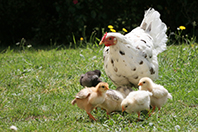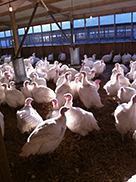Small Holders Site
Introduction
At Crowshall we realise how important your chickens are to you, whether kept as pets, for eggs or just for clearing up titbits. From time to time your birds may become ill and often expert help is required.
The vast majority of time and resources at the practice are dedicated towards the commercial poultry industry however by working with your own veterinarian we can help to ensure the welfare of your birds.
If you do observe any abnormal signs in yours birds, for example, sudden death, off feed, lameness, abnormal droppings, sneezing or snicking, feather loss, sudden loss of production, listlessness or weight loss then if there is not an obvious cause, then it is likely that some veterinary intervention is required.
In such circumstances we would firstly recommend that you contact your small or large animal veterinarian for a first opinion consultation. The vast majority of issues can be resolved through this approach. If your veterinarian requires some additional support then it may be that you could be referred to the practice, or alternatively we do liaise with general practitioners to help in the diagnostic and therapeutic approach.
Below is a guide to some of the more common symptoms seen in poultry and how they can be treated. The information is in part taken from the BVA Animal Welfare Foundation and The Poultry Club and is offered as a guide and should not be a substitute for contacting a veterinarian.

Disease Overview Section
Coccidiosis
This disease can be seen in all birds from 3 weeks of age and is characterised by listlessness, head sunk into the neck, white diarrhoea and sometimes blood is observed in the faeces. It is caused by a parasite which all birds will be exposed to. Birds will eventually develop immunity. The disease can be prevented by maintaining low stocking rates, dry litter conditions and using preventative in feed coccidiostats. Where feed is not purchased in bulk from a mill then drinking water medications with Baycox (toltrazuril) may need to be considered. Paracox vaccine is also available and can be administered to chicks in the first few days of life to protect them.
Blackhead (Histomoniasis)
This disease can be seen in turkeys, pheasants, guinea fowl but is uncommon in hens and can be chronic in peafowl. It is characterised by listlessness, head sunk in neck and yellow diarrhoea. The disease is caused by a parasite known as Histomonas meleagridis and can be carried in the earth worm, caecal worm and can also spread directly between birds leading to significant mortality. There is no licensed treatments for this infection since the withdrawal of dimetridazole from the market. To prevent then avoid mixing chickens and turkeys on the same land, ensure a good worm control programme is in place to prevent the intermediate host - caecal worm from becoming a vector. Birds can be wormed using Flubenvet in feed or Solubenol via the drinking water.
Bacillary White Diarrhoea
This bacterial infection (Salmonella pullorum) can cause significant losses in chicks 0-3 weeks of age and adults can remain carriers. The main symptoms are white diarrhoea, pasting of vents, thirst and sudden deaths. The birds can be treated with antibiotics but usually blood testing is recommended and any carriers should be culled.

Worms
There are up to 6 different types of worms that can infect poultry including round worm, tape worm and hairworm. They can affect all poultry and can be controlled well by having low stocking rates and a regular worm control programme. Birds should be wormed at least every 6-8 weeks using Flubenvet in the feed or solubenol via the drinking water. The main symptoms observed are listlessness, greenish diarrhoea, gaping, and lameness in the case of waterfowl
Lice or Mites
There are four types of louse and two types of mite that affect poultry. birds usually present with the parasites around vent, listlessness, blood spot on shells, dirty crest. There are only limited licensed antiparasitic treatments for poultry usually in the form of louse powders. Depending on the type of parasite then additional treatment of the environment may be required. In the case of red mite, treatment of the environment with cypermethrin based anti-parasitics needs to also be considered. Care with using Avermectin based products in geese.
Mycoplasmosis
Mycoplasma



